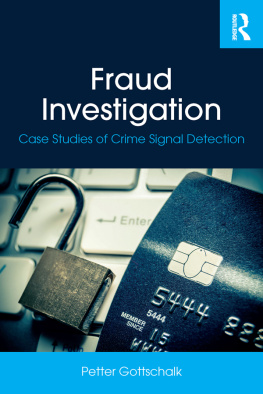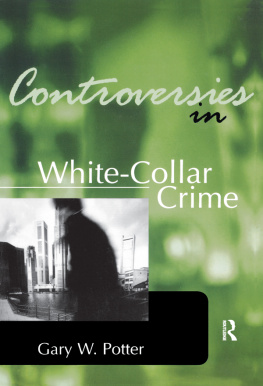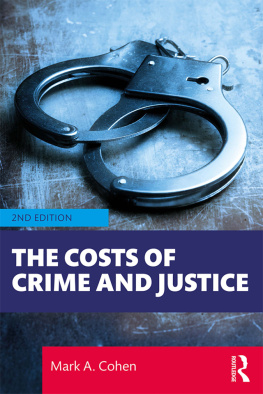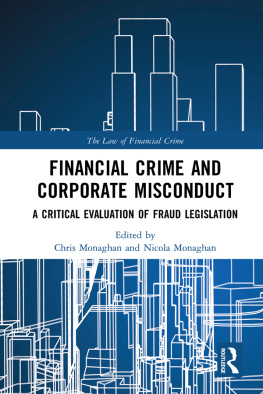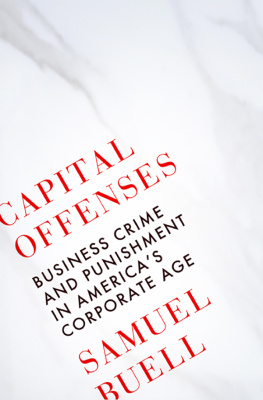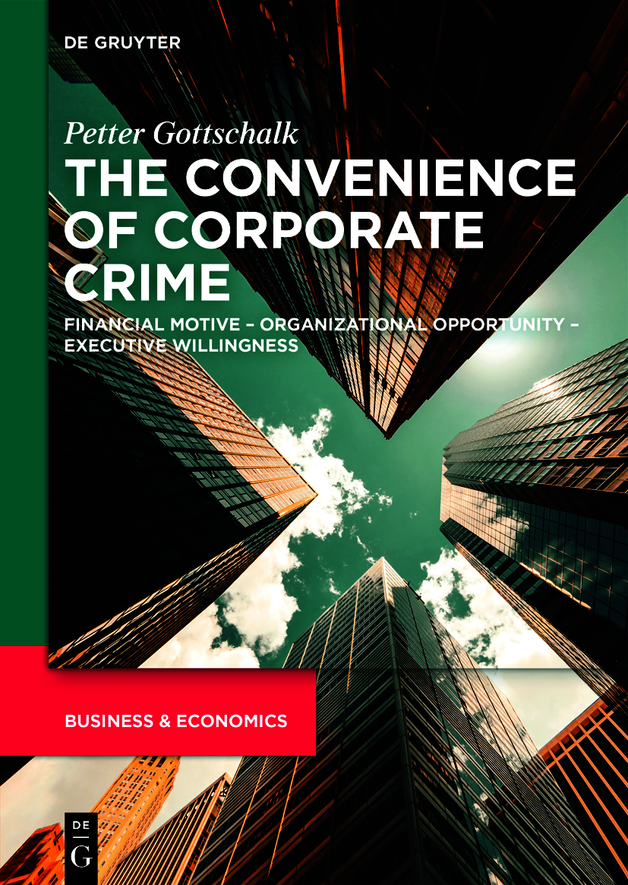ISBN 9783110766899
e-ISBN (PDF) 9783110766950
e-ISBN (EPUB) 9783110766981
Bibliographic information published by the Deutsche Nationalbibliothek
The Deutsche Nationalbibliothek lists this publication in the Deutsche Nationalbibliografie; detailed bibliographic data are available on the Internet at http://dnb.dnb.de.
2022 Walter de Gruyter GmbH, Berlin/Boston
Introduction
Almond and ).
Corporate crime, often called organizational offenses or business crime, typically results from actions of several individuals in more or less rooted cooperation ().
Corporate crime leads to individuals as defendants because a company cannot face prosecution and incarceration ().
found that the United States model of corporate crime control combines corporate criminal liability with a practice of reducing sanctions, and often withholding conviction, for companies that assist enforcement agencies in identifying more serious criminal violations.
At this point, however, it is important to emphasize that this book is not about law and legal institutions. Rather, the book builds on perspectives from disciplines such as management, organizational behavior, sociology, criminology, and psychology.
Corporate crime represents violations of integrity as well as failure to comply with moral standards, as in the example of corruption managed by Siemens executives in Germany ().
Corporate crime may ultimately provide an individual with some tangible benefit, such as a promotion, bonus pay, or gifts for exceptional performance, as well as benefit individual members of the organization collectively (: 178):
Yet, the primary purpose of committing a corporate crime is to provide a benefit to the corporation. Accordingly, corporate crimes have a distinctly organizational focus irrespective of whether they are committed by one person or 100 persons.
As argued by : 343), too little insight exists about the extent, structures, and development of white-collar crime and its multifaceted varieties, especially when it comes to corporate crime:
() this is largely explicable by the well-known and persistent difficulties of measuring undetected acts of corporate wrongdoing ()
Pontell et al. (: 10) argued that the lack of focus on corporate crime is partly a function of the visibility of the offense and the ease with which it can be officially pursued.
Law-and-order policies are mainstream strategies in many countries. Yet Alvesalo-Kuusi and Barak (2020: 1) found that such policies have not been extended to corporate crime:
On the contrary, many societies have witnessed the downsizing of both the regulation and enforcement of harms caused by the powerful. Corporate crime prevention in particular has been somewhat ignored by academics, even within critical criminological and socio-legal studies.
made the same finding that lack of regulation and de-regulation cause absence of corporate law-and-order enforcement. Downsizing of regulation, lack of regulation and deregulation, and downsizing of enforcement improve the convenience of corporate crime.
Convenience is savings in time and effort, reduced pain and strain, and other factors that make a certain path or choice attractive. Convenience is the state of ).
In the perspective of preventing and prosecuting corporate crime, Haines and Macdonald (2021: 299) argue that addressing corporate crime and harm is not simply an issue of enforcement and compliance:
Neither is it one of digging deeper to find the ultimate root of the problem the reproduction of power relations is nothing new to criminology. Understanding the direction of prevailing winds that shape business activity is important though in understanding where change is possible. Grappling with injustice is just that looking for sources of influence ultimately requires going beyond blanket classifications of law in all its forms as either helpful or unhelpful, and understanding which law, from which place and used in which way within a field of struggle is important.
Within the context or framing of organizational or corporate crime and the actors or perpetrators of these offenses, this book makes crime mainly an endogenous phenomenon. The book offers a holistic approach for making sense out of several case studies through the theory of convenience. Exogenous factors are included where appropriate, such as criminal market forces.
The first part of this book presents theoretical perspectives on corporate crime. Corporate crime is white-collar crime that benefits the organization rather than the individual (Chapter 1), which can be explained by convenience theory (Chapter 2). Detected and prosecuted corporate crime require corporate deviance accounts (Chapter 3) and a crime-response match (Chapter 4).
The second part of this book presents a number of case studies of corporate crime, where corporate offending reflects criminal market structures. The first case is concerned with the Swedish telecommunications company Telia that is involved in corruption to obtain mobile phone licenses in countries such as Uzbekistan (). There are criminal market forces requiring corporate crime in the form of corruption (Chapter 5).
The second case is concerned with Danske Bank in Denmark that is involved in money laundering and tax evasion for Russian oligarchs and organized Russian criminals (Bruun ). There are criminal market forces requiring corporate crime in the form of money laundering and tax evasion when providing wealth management services (Chapter 6).
The third case is concerned with Trafigura in the United Kingdom that is involved in environmental crime by dumping toxic waste in the Ivory Coast and Norway. One corporate crime project was about getting rid of the dangerous waste after Trafigura was denied access to waste disposal at the usual site in Africa. The redirection of the Probo Emu tanker to Norway is considered the project (). There are criminal market forces requiring corporate crime in the form of environmental harm in waste disposal (Chapter 7).
The fourth case is concerned with ABB in Switzerland that is involved in cartels by agreeing with competitors such as Nokia in Finland who should serve specific markets and customers with communication and power cables, and who should stay away from the same markets and customers, without fear of punishment (: 106):
Leniency offers corporations the possibility to come clean about their involvement in cartel conduct in exchange for immunity or reduction of financial penalties. In Europe, nearly 60 percent of detected cartels are discovered through leniency.
Cartel activities are not limited to cable markets involving companies like ABB and Nokia. Cartels do also exist among their customers in the construction business (). Cartels are associations of independent corporations in the same industry that strive to reduce competition (Chapter 8).
In the car manufacturing industry, German car producer Volkswagen was one of the manufacturers who committed emission standards violation. Their computer software enabled the vehicles to pass emission tests under laboratory conditions while emitting forty times the level of pollution allowed in the United States during normal use (Chapter 9).
The final case study in this book is about Wirecard in Germany. Wirecard was founded in 1999 to handle digital money transactions for pornography and gambling. In 2020, the financial institution went bankrupt. The Wirecard scandal is a series of accounting frauds that resulted in the insolvency of the German payment processor where 2 billion disappeared (Chapter 10).


